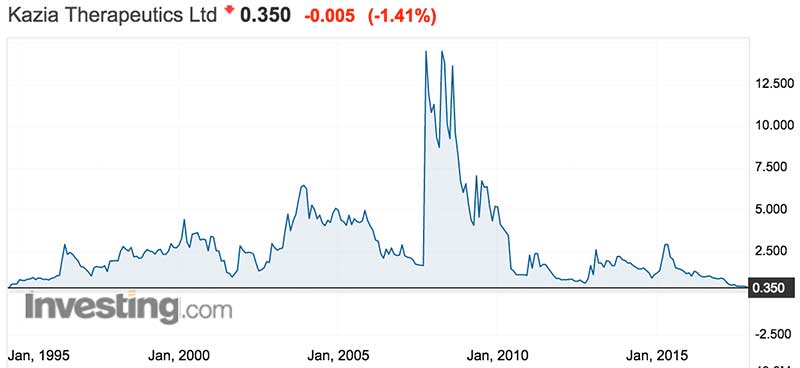‘We’ve earned it’: Cancer play Novogen restyles itself Kazia, leaves past behind
Health & Biotech
Health & Biotech
Cancer play Novogen has adopted a new name — Kazia — but the rebrand is not just “lipstick on a pig”, says chief Dr James Garner.
“Had we done this [name change] this time last year we’d have been open to the allegation that this was a cosmetic move,” Dr Garner told Stockhead.
“But this year it’s come after a whole sequence of things to transform the business,” he said. “We sort of feel like we’ve earned it.”
Novogen scrapped a marginal cancer drug called Anisina in April, which Dr Garner says produced inconsistent results in animal trials. The group also licensed a late stage brain cancer drug from Genentech and launched clinical trials for ovarian cancer drug Cantrixil.
It also cut the cost of the board by half.
Novogen (ASX:NRT) is now Kazia Therapeutics — a name drawn from Japanese business philosophy — though it won’t trade as KZA until after a 1-for-10 share consolidation at the end of the month.
Forrest Capital’s Anton Uvarov says the name change was necessary to turn a new page.
Novogen had in the past been a “pump and dump story” and didn’t have a good reputation with investors, Dr Uvarov said.
“[Today] it’s a company that now has a clinical stage asset with a good pedigree and a good size behind it,” he said.
“Overall it’s on the right track, focusing on the right program, the board seems to be focused.”
The consolidation with reduce the number of shares on issue from 483 million to 48 million.
Kazia’s shares were unmoved on Monday at 3.8c, the bottom of its 52-week trading range.

A gamut of drugs
Ove the course of 20 years, Novogen has run through a gamut of cancer drugs, anti-flammatories, wound healing, sleep apnoea technologies, and treatments for diseases such as cystic fibrosis, Alzheimers, Huntington’s and muscular dystrophy.
At one point in 2003 it was worth $800 million.
Today it’s worth $17 million after a sell-off in March and April this year sent the stock from a high of 10c to a low of 3.7c.
“What I think has been happening here is really just one or two large long standing holders have been unwinding their positions over time,” Dr Garner said.
Those sellers are individuals and in one case, the shareholder has been selling down to get capital to start their own new venture — “unfortunately at our expense”.
Dr Garner believes the selling has dried up now.
He also says they’ll be staying on the Nasdaq for the time being. A third of the register is held by US investors and if they choose to do a US deal, the Nasdaq shares could come in handy.
An arrangement last year giving the chairman control over any un-voted US proxies has also been put on hold after complaints from shareholders.